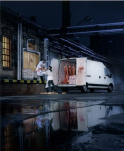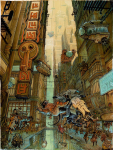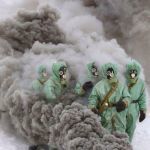Rick Wayne's Blog, page 93
March 2, 2017
Why do detective stories always take place in Los Angeles?
I was listening to some lectures on the detective novel on the plane, and the dude really had some neat points. (Go figure.)
But first, for background, you have to know that American detective fiction, sometimes labelled “hardboiled,” grew out of the English detective novel, which tended to be very genteel. The detective in the English stories, for example, was always protected by law and custom. Agatha Christie’s Hercule Poirot was never really in any danger from the murderers he was perpetually confronting. (Imagine elderly Miss Marple trying to solve a murder in Phillip Marlowe’s world and you can see the difference.)
To be clear, an American, Edgar Allen Poe, actually invented both the detective novel and the gentleman-detective, which is why the label “hardboiled,” which distinguishes Depression-era (and later) fiction from its predecessors, is probably more apt. Here we trade Poirot and his bourgeois obsessions for men like Ned Beaumont, the intensely moral but ruggedly individualistic streetwise womanizer who operates on his own moral code even when working outside the law — which became the paradigm for the action movie star, the “loose cannon” TV cop, and so on. But then, we know all this.
What I thought was interesting was where the lecturer noted that most of these stories — from The Maltese Falcon to Blade Runner — take place in L.A., and that there’s a reason for that. The rugged individualist, whose ancestors fled to this country to get away from the falsely genteel Old World, with its religious persecution and class oppression, must in turn flee the East Coast as the population rises and it becomes a miniature version what was left behind. So the rugged individualist goes to the frontier, figuratively, and we get cowboy stories.
But as the frontier is pacified by the railroad, there are fewer and fewer places to go. Eventually, he can’t go any further. The West coast, and Los Angeles in particular, is where he has to make his last stand against the corrupt society that has now fallen in on him. And the geography of the place perfectly fits this narrative — Southern California is so superficially beautiful, with the weather and all. It’s the perfect literary backdrop for stories seeking to create a contrast between truth and fiction, appearance and reality. (Of course, Vegas could also work, and Magnum P.I. seemed to get on okay in Hawaii, but those are all variations on a theme.)
Thus the hardboiled detective is really another incarnation of the great American myth of the rugged individualist, from the minuteman to the cowboy and so on, one who is presented in American detective fiction as a dying breed — a man who refuses to “sell out” and so is always struggling for money, a man who always finishes the case, who always figures out the truth even when he can’t bring the politically connected Big Fish (paradigmatically, Trump) to justice, and so on.
Of course, society never stops coming, especially after the advent of the computer, and by the turn of the millennium, our mythical individualist had nowhere else to flee, except underground, and so he’s either a half-man struggling (badly) with the perils of domesticity, like the guys in True Detective, or else he drops out entirely and becomes the cyberpunk warrior, a man literally on the run from an oppressive and totalitarian society that is now so corrupt it barely keeps up the pretense, a society that seeks to crush him at every turn, a society where he can only operate as a criminal (Kaneda), an outcast (Case), or a mental patient — or all three, such as “Jack” from Fight Club, on whom Elliott from Mr. Robot was based.
It’s interesting that what we’re seeing now are a lot of nostalgic repetitions of the myth, stories where the protagonist — someone solidly inside the system, someone less uniformly male, someone who would have been the rugged individualist if they hadn’t been co-opted by society — makes a discovery about how things used to be, and so lives in that world for a time, which is a bit like pulling a photo from a box or a relic from a museum. It’s not real anymore. It’s a ghost, no longer alive, and so eventually it has to go back in the box.
Eventually that will get old, which raises the obvious question, what will come next?
cover image is from the ultra-violent manga Sun-Ken Rock


February 27, 2017
In the Beginning: a very short history of religious thought
It starts with a crisis, the singular belief that defines the religious history of our species: that this world, full of suffering, where the race does not go to the swift nor food to the hungry, cannot be all there is. That there must be something more.
So it is, the divine singularity, the unity of creation, shatters. And mankind is left separated from the divine. In one of the earliest recorded myths, the ancient Sumerian creation story, that the universe is a cosmic mountain, a union of heaven and earth personified by the god An and the goddess Ki, respectively. The pair mate and bear the great sky god Enlil, who spawns the world when his birth forcibly splits Anki apart. In one Chinese tradition, the primal universe is encased in a great egg along with the first man, Pan Ku, who cracks the egg as his consciousness stirs. The lighter parts rise to create the heavens (yang) while the colder parts settle to form the Earth (yin). In India, Atman (absolute being) grows lonely and mitotically populates the universe.
Painfully separated from the divine, humans arise humbly — even despicably — out of the primordial tragedy, which is why we’re forced to wander a cold and indifferent world as we search for a way home. It is, it seems, our lot to suffer. So we read that Pan Ku grows to an immense size before dying and creating the mountains and the rivers with his flesh and blood, while people grow from the parasites on his body. According to the Babylonians, the high god Marduk destroyed the dark forces of the dragon-goddess Tiamat, who represents formlessness or chaos and who must be conquered for order to appear. Marduk mixes the blood of Tiamat’s slain general with clay to make humans. And in the most famous origin story of the Western world, Yahweh creates humans from dirt after splitting form from void, light from dark, and water from land. He finishes by splitting female from male and finally both from paradise.
According to most religions practiced today, we cannot cross the gap on our own. But it was not always so. In mankind’s earliest understandings, the gulf between human and divine, while present, was easily tread. Early tribal cultures frequently imagined the spirit world as a formless limbo hovering over the land, where one’s ancestors were an immediate aspect of everyday life and their anger more pernicious to the family than even the gods’, who usually had far grander interests. Tribal peoples used rituals and dance, often involving psychoactive “medicines” (like tobacco) to contact and influence the powers of the dream world, which was so close to our own that we visited it every night in our sleep. Mediums and shamans were called forth from ordinary men and differed from them only in knowledge of the spirit world and skill in traversing it.
But that begins to change at the border of history. As agriculturally settled societies grew more urban and stratified, writing developed, and the conditions of men deteriorated, our estimation of the divide between the human and divine grew both in space and in variety. The Aztecs, like Plato, believed that the world of man was an impermanent dream or refraction of the divine, which alone was truly real and which could only be contacted abortively by a priest with specialized training. The only people who can move across the widening gap — prophets, saints, or heroes — are now imagined as semi-divine and their exploits are responsible for the state of men, exploits that must be honored and often recreated to insure the continued operation of the natural world, such as the arrival of the harvest. Thus we are told that Gilgamesh, a mythologized historical king, was one-third human and two-thirds divine. His story, the Enuma Elish, was read aloud by priests at the Babylonian New Year in order to ensure the return of Spring. Similarly, many of the ancient Greek heroes were, like Heracles or Achilles, the half-divine offspring of gods or, like Orpheus, possessed of divine arts or skills. They alone can cross. Indeed, the only people here in regular communion with the divine are oracles and priests, who demand rents for their labors.
After the advent of high cosmopolitanism around 500 BCE, the rift between human and divine reaches its peak. No longer do the gods wrestle with men (as does the god of the house of Abraham) or seduce lovely maidens with showers of gold (as Zeus comes to the beautiful Danae), and spiritual leaders no longer straddle both worlds as a mix of human and divine. Neither Confucius nor Buddha nor Socrates — all roughly contemporaries — were divine, and they only ascended to “heaven,” if at all, on revelation. Muslims believe as a strict measure of faith that the Prophet was entirely human. And since the end of the Arian controversy a millennium and a half ago, standard Christian dogma states that Jesus was fully human.
What’s more, neither could climb Mount Olympus on their own, but both were brought to heaven by God only after suffering, horribly, the primordial rift in reverse. In the West, prophets have a terrifying, usually painful encounter with an angry God, so overwhelming that messengers often deny their calling. Moses refuses God’s anointment several times until at last he’s allowed the help of his brother Aaron. The Prophet Mohammed was so pained by his visions of the angel Gabriel that he thrice refuses the call.
“[The angel] came to me… while I was asleep, with a coverlet of brocade whereupon was some writing, and said, ‘Read!’ I said, ‘I cannot read.’ He pressed me with it so tightly that I thought it was death; then he let me go and said, ‘Read!’”
Indeed, Mohammad stood ready to throw himself off a cliff rather than face his people bearing a message from the Almighty. The world owes the great and lyric poetry of the Koran, the greatest of all medieval literature, to Mohammed’s faithful wife Khadija, who sent her servants to find him.
But where in the West we’re all servants of Satan and just don’t know it, in the East we’re all God and just don’t know it. Here the saint usually experiences a peaceful (rather than painful) revelation of the human condition: that all is One. The Hindu yogi comes to this heightened self- and universal-awareness — that everything is a fragment of Atman — though deep meditation, sinking inside oneself and away from the world. Thus it is through a reverse recreation of Atman’s first stirrings, where He split into all things, that one heals the original rift. The Buddha Sakyamuni, working within this same tradition, escaped beyond being itself to unify with the essential nature of the universe, which is emptiness (sunyata). And the Daoist sages urge peaceful surrender the unspeakable Way of all things.
But in both cases, East and West, modern saints do not bring revelation. Rather they bring a restoration — a “proper” recognition of the original crisis, which had become degraded. It is for this reason that major faiths become quickly (and damnably) conservative. Consider that after having a vision of the Sun as the one true God, bringing monotheism to Egypt 2,000 years before Mohammad, the Pharaoh Akhenaton (circa 1350 BCE) attempted to erase the traditional gods of Egypt. Immediately after his death, it is he who was erased as bands of scribes and masons scoured the architecture of the Nile valley to chisel away any reference to “that criminal.” Jesus, on the other hand, famously asserted that he had not come to change the laws of Moses but to fulfill them. (Jesus started as a Jewish reformer and he would have remained a Jew if not for the conceited efforts of Paul to usurp the disciples with his vision of a God for all people.) According to the Koran, the Prophet is only the last in a long line that has touched all the people on the Earth. “…there never was a people, without a warner having lived among them.” And while Confucius may be the most revered man of classical China, he worshiped the memory of mythical rulers that preceded him — Yao, Wen, and the Duke of Zhou — whose virtue was an example for all time.
“I am not one who was born in the possession of knowledge,” says The Master. “I am the one who is fond of antiquity and earnest in seeking it there.”
Having rediscovered the timeless path, which had been betrayed, the saint carries us along by the strength of his works, which are a treasure trove of merit. In order to experience the cosmic reunion, to cross the void between this world and the next, we climb to God as it were on the back of the prophet. This is the function and purpose of ritual, which has the penitent invoke the plight of the saint as a sort of credit against the debts of our soul. Christian sinners partake of the body and blood of Christ, which was broken on the cross. Indeed, most cathedrals are shaped like crosses with the sacraments taken at the heart, and Catholics repeat the rosary in much the same way that Mahayana Buddhists of the Pure Land tradition, which identifies nirvana with a kind of heaven, repeat the nembutsu, the invocation of the Amida Buddha. It is the grace and work of the compassionate saint — Mary or Amida — that elevates the impassioned sinner, who could never make the crossing on their own, to the pure land.
Of all rituals, however, the pilgrimage is the most powerful as it both physically enacts the crossing of the primordial rift and engages the penitent in the agony of the saint. The Hindu word for pilgrimage is tirtha-yatha, from the Vedic root referring to the ford of a river, and the great Ganges is for Hindus the connection between this world and the next, the place to bring one’s honored dead. Muslims participating in the largest pilgrimage in human history, the Hajj, literally follow the footsteps of Mohammad and Abraham and recreate the banishment of Satan, who bars us from Allah.
It is sometimes suggested that our era, beginning about the year 1500, is one of Enlightenment, where we have turned round completely and no longer find salvation in a mythic past but look instead to a mythic future of material comfort based on reason rather than faith. But it has never really been so. Most people alive today — the vast majority, in fact — still find peace and hope in the personal victory of a saint, just as it has been for the entire history of our species. Widespread reorientation of our basic myth, if it is to come, is likely as far from us as we are from ages past.
[image error]
cover image: “Father of the Sun” by Timofey Stepanov


February 16, 2017
It was a bad sign
It was a bad sign.
Ruud stopped when he saw Zen-ji standing outside the closed doors to Erasmus’s chambers. The stiletto killer straightened his velvet tie and brushed back his pomaded hair before walking up the last few steps and standing before the giant Japanaman. He didn’t look up. There was no point. Zen-ji’s colorful, curved helm kept his face hidden. Nor was there any point in speaking. Ruud would either be allowed to enter or not. He’d either be killed or not.
After a moment, he cleared his throat and the samurai opened the doors.
Sciever sat on a couch in the waiting room, clutching a highball. He was swollen and covered in bandages, including over one eye, and he popped a palmful of pills while he feasted on the beating in Erasmus’s office.
“Rabid’s dead,” he said without turning.
Ruud nodded as his eyes followed the splatter. Togo smacked a big man in the face with his brass-knuckled fist. The man’s head wobbled but he was still conscious. His arms were tied behind a rickety chair that rested on plastic sheets.
Ruud looked around. The girls were gone. That was unusual. The boss always liked company. “Who’s left?”
“Not many.” Sciever watched the beating. “Zeek’s dead, too.”
Ruud nodded and lit a cigarette. “I heard. Lying in a warehouse with her face blown off. Where are all the girls?”
Sciever shrugged.
“Who’s the big guy?”
“Are you nervous?”
Ruud exhaled smoke. “Huh?”
“You always ask a lotta questions when you’re nervous.”
“I gotta talk to the boss.”
“Good luck breaking in on that.” Sciever nodded.
Togo’s tattooed face scowled and he beat the man across the jaw in the opposite direction. Something cracked.
Ruud puffed twice then exhaled. “Yeah, well I gotta try.” He walked through the open doorway into the office. Erasmus was behind his desk facing his prey with floating eyeballs. Tiny bubbles clung to his brain.
Ruud turned and breathed in. The man’s entire face—his eyes, his lips, his cheeks—were red, blue, and swollen. His fat lower lip was cut and his mouth oozed blood and phlegm. He was missing several teeth. Ruud walked toward the bar as the man spit blood defiantly.
“What the fuck are you doing here?” Erasmus was quiet.
Ruud reached over the bar for a glass and a bottle. “I have bad news.” He heard the crack of another punch. The faceless man was half laughing, half crying. Ruud turned around but didn’t look. He poured himself a drink.
“You see this tragedy, Ruud? He had bad news, too.”
Ruud emptied the glass in two gulps and looked at his boss as he poured another. “If you wanna kill me, go ahead. Just make it quick. No way I can take a beating like that.”
“’Course not. This man is a fighter. He’s taken worse beatings than this. Isn’t that right?”
Togo hit him again. There was a fat slap.
The man coughed through swollen lips and missing teeth, and his voice rasped like escaping gas. “I dunno where he is.”
“Where does he go? Who are his friends?”
“He dusn hav friens.”
“Everybody’s got friends. Even Ruud, here. You don’t get by in this town without friends.”
“Jus his siser.”
“We already checked the sister’s apartment!” Erasmus yelled.
“I don know.” The man shook his head.
Togo scowled and hit him again. A tooth bounced off the wall and landed on the carpet. The man started to sob.
Ruud nodded toward him. “He know the runt?”
“Spit it out,” Erasmus growled at Ruud. “What’s the word from uptown?”
“The Empire is going to declare martial law.”
“What?”
“They’re about to roll tanks into Old Amazonus and work their way out to the hills. House to house cultural inquisition. Total purge. Aminals. Mechanoids. Criminals.”
“Criminals, huh? Then they should start at City Hall. What the fuck do we pay those assholes for if I gotta hear this from you?”
Ruud shrugged and puffed on his cigarette. “You hear anything from our contacts in the Capital?”
Erasmus was silent for a moment. “No. What else?”
“Anybody with a passport is getting the hell out. Freecity is about to be a ghost town.”
Erasmus didn’t reply. Togo looked at him and waited for an order.
Ruud cleared his throat. “That means no business at the Dark Red or any of our casinos. And the Empire will round up anyone with Neverod paraphernalia, which means all our customers are about to go bye-bye.” He waved.
Sciever walked into the office. “There’s someone here to see you. Out front.”
Togo shook his head at the swollen man. It was not a good time for house calls.
“He says he’s from the Hand.”
“What the fuck do those nut jobs want?” Erasmus barked.
“He says it’s about Jack. And the end of the world. The guys told him to buzz off, but he’s got a box of scythe beetles. Not that it matters, I suppose. Carnival is empty. But he seems set on talking to you, or making one bloody mess.”
“Beetles? That’s clever. Bring him down.”
Togo raised his eyebrows.
“But take the gods-damned beetles off him first!”
“Right.” Sciever walked out.
“What the fuck do those crazies want?” Ruud asked.
“Shut up and get back uptown. I need you to keep an eye on things. Get up to that ship.”
“How am–”
“’Cuz it’s your fucking job!” Erasmus yelled. “I don’t care how. Cunt-lap a ninety-year-old heiress. Just get aboard that ship! I need at least a couple hours’ warning on those tanks.”
“Right.” Ruud downed his drink, snuffed his cigarette, and walked out.
“What about this guy?” Togo asked.
“Shoot him in the balls.”
“No . . .” Dobie sobbed. “Please . . .”
Togo pulled a gun and shot. Dobie started screaming.
“Gag the fucker!” Erasmus moved his spider contraption out from behind the desk as a half-mechanoid man walked into the room. He wore no clothes. Spindly metal limbs extended from his abdomen to the floor. One of his eyes was artificial. “Did you search him? Inside and out?”
Sciever nodded. He held up a set of black robes draped over his bandaged arm. “He’s clean.”
“All right, asshole. You wanted to talk to me. Talk.”
The half-mechanoid looked at the man in the chair, then Erasmus. He spoke with a thick Futurian accent. “I have come to make an offering, and to deliver a warning.”
“Aww, and you thought of me?” Erasmus mocked. “Fuck. Will somebody please dismember this thing?”
“Wait!” The half-mechanoid raised his hands. “The Amazons have returned, as was foretold. Their coming heralds the return of Kraxus.”
Sciever smirked and looked at the floor.
“You think you’re the first hybrid we’ve had down here?” Erasmus asked. “We got a blowtorch in the closet, next to the broom and the toilet cleaner. No bullshit, you cultist fuck.”
“Black Jack the Wanderer has taken refuge in the Old Arcade.”
“So I’ve heard. Tell me something I don’t know.”
“He’s getting a skin job as we speak. Soon you will not be able to recognize him.”
“Fuck.”
“We won’t allow your people in the Arcade, but we can bring him to you. For a price.”
“Of course.”
Everyone but Dobie was silent as Erasmus thought. The fighter gasped through his gag in short rasping breaths as his head rolled about.
The voice box in the mechanical spider clicked on. “I’ll give you five hundred large to kill him. But I want his body as proof. No body, no money.”
The naked assassin smiled.
“And I’ll double it if you find the ray gun.”
The assassin bowed and followed Sciever out.
Togo watched him go. “That’s a lot of money.”
“I want everybody we got left looking for Vernal the Infernal. Everybody! Shut down the casinos. Drag the carnies out of bed. Get the dealers off the streets. Call in the books. I want everybody, and I mean fucking everybody not mothballing the Dark Red out looking for that venereal half-pint and the wisps of hair on his scrotum-shaped head!”
Togo nodded. “And him?” He pointed at the blubbering boxer.
Blood dripped from Dobie’s crotch to the plastic below. He clung to life by a fingernail.
“Take him upstairs and feed him to Archie.”
Togo gulped. “Right.” He hated feeding the giant squid. The beast had twelve very long tentacles. You could never keep track of them all. “And Jack?”
“Zen-ji!” Erasmus moved his contraption back around his desk and settled in. “Don’t worry about Jack.”
“But–”
“I said don’t worry!” Erasmus snarled.
The ten-foot samurai blotted the doorway to Erasmus’s office. He had to bow to fit under the frame, and his footsteps shook the floor. As always, his face was invisible.
“Go to the Arcade. Keep an eye on things, but don’t engage. You hear me? Stay away from Jack. If those wackos kill him, make sure to get the body. If not, I wanna know where he goes.”
The giant warrior bowed, turned, and strode like a hunting cat out of the room.
The fluid in Erasmus’s glass tank started bubbling and his eyes bounced off each other. “The Hand will slow him down, buy us some time. But in the end, Jack Fulcrum will come to us.”
Togo grunted and lifted the limp, dying fighter over his shoulder. “How can you be sure?”
“Because this has happened before.”
art by Tamas Kerti, pretty much exactly as I imagined the technocrat priests of The Black Hand from my first novel, a pulp called FANTASMAGORIA.
[image error]


February 13, 2017
Declun had said she was big, but she was SO big
Christine Adjani sat by herself at the round white table in the nook by the bay window, smiling in silence at old pictures of her and Declun, when the double doors across the living room shattered inward.
The jolt of surprise sent her manicured fingers flying. Her phone landed in the corner as the young woman stood behind her chair, her wide eyes pinned to the behemoth striding through the swinging, splintered remains of her front entry.
She was so big. Declun had said she was big.
But she was SO big.
Christine would have recognized her anywhere, even though they had never met. It was the hair. It was just like AJ’s, but even wilder—who would’ve thought that was possible?—and two shades lighter in color. Same as her eyes. It wasn’t hard to see what had drawn Declun to her. Before. When she’d been smaller.
And demure.
But there was hardly any of that left. The woman in the entry was someone else. Her breasts were all but gone. Her prominent brow fought her jaw for dominance of her face. Her arms and legs were . . . unbelievable. Christine had known plenty of big guys. Her brothers were both over six feet and muscular. But their limbs were covered in a natural jiggle.
Xana’s swung solid like steel girders.
She didn’t look at Christine. She simply strode for the hall to the bedrooms.
“He’s not here,” Christine blurted.
Xana stopped. But she didn’t turn. She just waited for an explanation.
Christine stood behind her chair and gripped the back tightly. “Declun took him to the doctor.” She looked to the side. “Or at least, he was supposed to. The school called. He was late.”
Xana turned. She was scowling. But not at Christine.
And right then, in her face, the young woman saw the truth of it. All of it. Everything the McDooms had told her about AJ’s mother.
Lies.
Or everything that mattered anyway.
Christine shut her eyes for a moment. She had believed it. She didn’t have reason not to. Or so she thought. But it was all a lie. Just like the rest. And they got away with it. Just like always. How easy was it, how easy for people to believe, when Xana looked like that?
But now that the big woman was standing before her, angry face rimmed in pain, Christine could see. Xana couldn’t help how she looked. Of course she couldn’t. And she loved her son. Of course she did.
Shame turned the young woman’s skin pink, and it showed even through her makeup.
“Doctor?” Xana took a couple steps closer and the floor shook. “What’s wrong? Is he sick?”
Christine looked up. Her heart broke at the sight of Xana’s heavy face. Once stoic as a dam, now it cracked in a flood of fear.
“Is he . . .”
Christine waited.
“Is he growing? Normally, I mean.”
Christine could tell Xana almost didn’t want to hear the answer. She nodded. “He’s a healthy little boy. He just has his mother’s muscles.” She looked up. “And her hair.”
Xana’s shoulders dropped in relief. She looked down and saw the shattered bits of door on the floor. “I’m sorry,” she said softly. “For the mess. I didn’t think anyone would . . .”
“Be here? Or let you in?”
Xana shrugged.
Christine nodded. It didn’t really matter.
Xana looked at the beautiful woman before her. Her makeup was pristine. And expensive. And her jewelry . . . Xana was sure the earrings alone were worth more money than she had made her entire life.
She looked down again. “You’re not what I expected.”
Christine had no idea what to say. “You must hate me.”
“Thank you. For taking care of my son.”
The young woman nodded. “Wait.” She lifted her expensive heels over the pieces of door on the floor and walked to the kitchen. “I have something for you.”
“For me?” Xana took a few steps forward, then stopped and waited. “The police are on their way,” she said to fill the silence.
Christine retrieved a piece of paper from a stuffed drawer. “Police?” she called. Then she realized. To get up to the tenth floor, Xana would’ve had to force her way past the doorman downstairs. The security desk would have phoned it in immediately. She wondered how much time they had. And why Xana didn’t seem to be worried.
Christine walked back into the living room and held out the paper. “I kept it in the drawer with the bills.” She rolled her eyes. “It’s the last place Declun would ever look. I knew he’d just get angry. If he saw.”
Xana took it. It was white. Heavy. Construction paper. She turned it over.
It was a drawing. Just like the one Sister Rosa had shown her back home. It was AJ’s. An explosion of crayon. Swarms of lines. Still, Xana could see herself clearly. She’d beaten just about every costumed villain—and hero—the boy had ever seen.
Christine shifted in her expensive shoes. She realized they’d both been on their feet and she should probably ask her guest to sit. But then, both of the off-white couches were covered in door debris, and she wasn’t sure Xana could fit between those narrow, padded arms of the chairs at the table. Not that Xana seemed like she needed to sit. She didn’t shift her weight like normal people did. She was motionless, legs like stone pillars, as her eyes burned holes in the drawing in her hand.
She was so big.
SO big.
Christine looked down to keep from staring. She wondered if muscles like that ever tired. Probably not. Xana could probably stand over AJ, protecting him, forever.
No, she stopped herself. Not just AJ. Xana could stand over everyone.
“His teacher called. He said AJ was making up stories.”
Xana looked up.
“About his mom. Wearing armor. Fighting bad guys. Saving people. During the blackout.”
Xana looked down at the drawing again. It was so much better than the one she had seen before. Maybe AJ would be an artist.
“Kids make up stories, of course. But his teacher said AJ wouldn’t let it go. That he was bragging to the other students.”
“Bragging?” Xana scowled. That was Declun’s influence. That wouldn’t do.
“He feels a little lost here,” Christine added quickly. “Like he doesn’t fit in. He tries to compensate for it. But he’s a little boy, like his father, and sometimes he doesn’t handle it very well. I guess some of the older kids started teasing him about it at recess. All his fantastic stories about his mom. He got into a fight. Over you.”
“A fight?”
“Hairline fractures in two fingers in his left hand.” Christine held up hers. “And he broke the bigger boy’s sternum.” She paused. “With one punch.”
Xana sighed loudly. She was missing so much. His whole childhood. Or so it seemed.
Christine looked at Xana. At her size. At her muscles. At the slight bulge under her shirt that hinted at a bandage on her chest. At the bruises on her face masked by her dark complexion. At the calluses on her knuckles. As if she’d been punching things. Hard things.
Repeatedly.
Christine looked at Xana’s face, full of sadness and longing. And hope. “It’s true. Isn’t it?”
Xana was silent.
“The things he said.”
Xana looked out the bay window at the building across the street.
“You really were on that bridge.” Christine’s lips pursed. “You saved all those people.” Her eyes welled. “Even me.” Why was it always easy to see through everyone else’s problems, she wondered, but never your own?
And then a thought. “Why did you come here?” Christine shut her eyes fast. That sounded bad. “Sorry. I mean, what is it you wanted?”
“To see him.”
“But why now? I mean, if you’ve been here since then, why didn’t you come before?”
Xana looked the young woman in the eyes. She wasn’t the only one who could see the truth of things. Xana knew that look on her face, the look of a woman finally accepting what she knew she should have suspected all along. It was the same face Xana had worn in Guyana. When Abby and Renkist tried to destroy her by peeling back the curtain the McDooms had draped over her world.
Xana thought about her first trip to New York, when she watched from her secret perch as her son ran into another woman’s outstretched arms. This woman. Xana had been so focused on AJ, she hadn’t thought about Declun’s new companion. She came from money. That was clear. She was poised, educated. And smart. She had seen through Xana well enough. That meant she was smart enough to see through Declun, too. Eventually. Not someone he would pick. That meant Christine was Mal’s choice. Probably some kind of arranged marriage.
Xana remembered the young woman’s face. At the school. As she knelt and held out her hands to receive a smiling AJ. “You care about him.”
Christine looked to her phone on the floor across the room. Full of selfies of her and Declun. “I did.”
“No.” Xana said softly. “Not Declun.”
“Oh.” Christine smiled. “Right.” Then the smile faded. “Yeah. I do. He’s such a great kid. To be honest . . .” Her mouth hung open.
Xana waited.
“I’m kinda jealous. Of you.”
“Me?” Xana’s eyes got wide. This woman was young and beautiful and rich and all the things Xana could never be. “I’m nobody. I’m a . . . a freak. I have to sneak around at night so I won’t be seen. I have no friends. Anymore. I don’t have a country or even a home, let alone one as nice as this.” She looked around. It was gorgeous. Or, it had been. Until Xana showed up. She looked at the shattered wood on the carpet.
“But you’re free,” Christine objected. “Maybe you don’t see it. You get to go anywhere. Do anything. And look at you. You don’t have to worry about anyone pushing you around or trying to hurt or control you.”
“Why are you with him?” It was blunt.
But Christine didn’t flinch. “Our fathers,” she said matter-of-factly.
“I see.”
The young woman nodded. “But you have AJ. And he thinks the world of you. He always will. No matter what. I know it seems like—”
Xana’s face finally cracked. Her lips quivered and she covered them.
Christine scowled. “I’m sorry. Did I . . .”
“Do you think so?” Xana asked softly. “No matter what?”
Christine nodded.
“Even if I have to leave?”
That was it.
That was why the big woman had come. Now. She wanted permission. For something. From her son.
Christine Adjani took two steps forward and reached out with manicured hands. She took Xana’s. They were so huge. Bigger than Declun’s. Bigger than everyone’s. “He already thinks his mother is out there doing something good and important. If you would’ve asked me ten minutes ago, I would’ve said it was just a story he was telling himself to avoid the truth.
“But I would’ve been wrong. You haven’t left him. At. All. And whatever you’re out there doing, whatever gave you these calluses, it’s important.” She paused. “Important enough to keep you away from him. For a while.”
The big woman’s bushy hair brushed against the ceiling.
She was so big. Her shadow was so big.
“Probably a lot more important than going to charity functions that cost more money to run than they raise.”
DING
Out the shattered door and down the hall, the elevator opened. Two police officers and a doorman stepped out.
Xana’s stoic face returned. She backed away from Christine immediately. “They shouldn’t see you with me,” she whispered.
“Why?”
“It’s not safe.” Xana walked around the mess she caused and stood in the door.
“All right, that’s enough.” The first officer, a bald man with a big gut, removed the metal cuffs from his belt and reached for Xana’s hands. He stopped. He looked at her wrists. He looked at the handcuffs. He looked at her wrists again.
There was no way they’d fit.
“I won’t resist,” Xana said quietly.
Christine grabbed her purse. “I’m coming.”
“Miss.” The doorman held up his hands. “You should stay—”
“I’m coming.” Christine pushed past the man. “She’s my friend. There’s just been a misunderstanding.”
Xana turned. She hadn’t expected that word.
Christine looked up at her. “I forgot to tell the front desk that we were expecting a guest. She just wanted to see her son. I want to make sure that gets in the police report.”
Xana kept her eyes on the young woman for several steps as the policemen led her to the elevator. The second man looked at Xana’s head. He wasn’t sure she’d fit.
There was a police van parked on the street out front. Everyone could see it clearly through the building’s once-secure front door, now bent outward. A small crowd waited just past the spray of splintered glass on the sidewalk. The police were ready for her. Two squad cars, one at each end of the street, temporarily warned away street traffic with flashing lights.
Xana got into the back of the van without a struggle. She sat as best she could on the narrow metal bench. There was a man in there with her. He wore body armor. No gun, but he had a riot helmet and a heavy, round-tipped baton.
Christine scurried in her heels to the back before the men closed the door. “I’ll get you out,” she called.
“You won’t need to,” Xana explained. “I won’t make it to the station.”
Christine scowled. “What? What do you mean?”
The doors slammed shut and the engine started. The van was waiting for one of the squad cars to back itself around and lead them through midday traffic.
The man in the riot helmet and body armor sat across from Xana, baton in hand, and stared.
“You will probably get hurt,” she said softly. “I’m sorry.”
“Shut up,” he barked.
Xana ignored him and leaned her head back against the metal side of the van. That’s when she heard his voice.
AJ.
Xana perked up. Her scalp tingled and seemed to tug against the elastic band that held her hair back. “Wait,” she whispered. She stood, head bowed under the ceiling that was too short for her, and strode to the back. Her steps shook the van.
“Sit down!”
The van’s rear double doors each had a long oval window, crosshatched with metal wire, so that any officers outside could assess the interior before unlocking the door.
And there he was.
Xana covered her mouth.
He was on the street. Right outside the van.
AJ was right there.
Not more than ten feet from her.
“Sit down!” the guard repeated. He stood and brandished the baton.
Hunched low under the ceiling, Xana couldn’t have cared less. AJ was there. Her son. Right in front of her. He was standing next to his father, who was arguing with Christine.
And then the boy must have understood what was going on, because he turned. And saw her.
Xana melted—wholly, completely—as AJ’s face lit up like a festival parade. She felt a warmth flood her. She felt fireworks, even in her artificial heart, and the power of it spread from her chest to the tips of her toes.
The boy ran to the van and pressed his hands to the metal. Declun called for him to get away. He wouldn’t even look at Xana.
The squad car on the street must have moved out of the way because the van jerked forward. Christine, wide-eyed, scurried in her heels to the front of the vehicle and planted both hands on the hood. “Just wait!” she yelled.
While the policemen outside politely asked her to please get out of the way, Declun pulled AJ from the rear of the van.
“Mom!” the boy reached out.
“AJ!” Xana’s hand went flat to the glass just as the officer’s baton struck her squarely in the back.
The man dropped it and clutched his wrist. “FUCK!” It was like beating on concrete.
Xana ignored him as she grasped the door, ready to rip it from its hinges.
But she stopped.
Her shoulders fell.
Her hands dropped to her sides.
Xana looked at the bandage on her son’s hands as he twisted and pulled in his father’s arms.
He had broken his finger. Fighting.
Had she taught him it was okay to fight? To hit people? On the bridge? He had broken another boy’s sternum. What would happen when he was older? Bigger? Stronger? Already his father was turning him into a braggart.
Xana pressed her hand flat to the glass one more time.
What would he think if she tore open the vehicle and threw the policemen to the side? That just because someone was stronger, they could do whatever they wanted?
That’s exactly what Malcolm McDoom wanted his grandson to think.
Xana stayed put, trapped by a conscience more powerful than steel.
As soon as it became clear the police had their hands full with Christine—or not, as they were too afraid to lay a hand on a wealthy man’s daughter—Declun set AJ down and dragged him toward the front of the vehicle.
But the boy pulled free and ran back to the oval window.
“Mom. Mom. I saw you.” His voice was muffled by the heavy glass. “On the bridge. I saw you fight that guy with the big arms. And you were all POW!”
Xana smiled and nodded, teary, as she watched her son excitedly recount the events of the blackout. He was getting so much bigger. She could see that now, up close. He was taller, and his face had more definition—a little less like a baby and a little more like a young man.
Xana kept nodding at the boy’s story as she studied every inch of his face. His clothes. They were nice. His hair was clean. And his fingernails, too. That wouldn’t have been the case back home.
“And then you went down to the river to save those people. And I know you didn’t want to hurt that guy.”
The van jerked forward again. Unlike the police, Declun wasn’t worried about handling his fiancée, and when it was clear she would rather make a scene than move, he picked her up and lifted her out of the street.
The young woman was furious.
The van pulled ahead.
“AJ!”
“Mom!”


February 3, 2017
Minn Ramsey spoke to God every day of her life
Minn Ramsey spoke to God every day of her life. But it was only after blessed Preacher Martin came to town that God spoke back. And not just to her. To nearly every resident of Mountain Hide, usually on a Tuesday. It was a miracle, to be sure, given on account of their faith. It had to be. Because there was nothing else.
The town was nestled in a crook in the mountains of West Virginia, and while it started as little more than a backwoods dugout for moonshiners, it blossomed after the coal mine opened. But luck wasn’t on the community’s side, and some time after Prohibition ended the coal ran out and there wasn’t much of a reason for anyone to stay all the way up there, miles from anywhere, with hardly a decent road to the place. Decades passed and folks moved on until there were only enough tithing families to support a single church and only enough deposits for a single savings and loan. By then, everybody knew everybody else by their first names, and it seemed like a sin to leave, even though most wanted to.
But all that changed after Preacher Martin came. He didn’t seem like much at first—bald up top, a little soft in the middle, with a round nose and a pair of eyebrows that didn’t line up straight. And sometimes his voice seemed a bit off, like a record player running a tad slow. But otherwise he was the same as anyone. There wasn’t even a hint as to the miracle he carried in his heart.
Minn knew that’s how Preacher Martin was. Humble.
First thing he did was meet with each and every one of his parishioners—in private so it was more comfortable. He sat them down in his office in front of a big camera, almost like a projector, and when it snapped a picture of you there was a sound like a shutter run backward, and you could see stars in the lens. Preacher Martin took everyone’s picture that way, even the folks who weren’t regular church goers, and he wrote down everyone’s names so he could memorize them all later. He talked to folks about prayer and the Bible, about the town, about their job, their likes and dislikes, even their hopes and dreams. He was such a nice man.
But not long after he arrived, everybody got to see that Preacher Martin was more than just humble. He was blessed of God. And not like those false tent-pole healers that ran through Deerlick every spring.
When Brandon Federline, 26, was carrying on with a high school girl, just 15, God knew it, and He told Preacher Martin, who asked Brandon to come up before the whole congregation—practically the whole town—and confess his sin publicly so he could be forgiven.
Of course, Brandon wouldn’t admit it at first, not something shameful like that, criminal even. But as soon as he figured the truth—that God really was watching and that He had told Preacher Martin things only Brandon and the young lady could know—well, Brandon felt the presence of the Holy Spirit. He broke down right there and dropped to his knees. He brought Jesus into his heart and begged for forgiveness.
There were lots of tears and hugs and more praising God that day than any Minn could remember. And it wasn’t about Brandon. Minn knew lots of folks were still angry about that. It was the bigger truth. Preacher Martin was blessed. He hadn’t been in town two months and already he’d battled a secret sin in their very midst. Real sin. Born of the Devil. And he won.
And that was just the beginning. Every time someone found themselves dancing, or giving in to the temptations of the flesh, Preacher Martin would stop by, or ask them to come up to the front of the church, and he’d stroke his comb-over gently and everyone could see he had God in him. He cured people of the weed and got divorced couples to reconcile. And every Tuesday he rode through the town and delivered a personal message from God.
He even got Minn the job at Gelid Cold Storage. She only applied because God had told her to, but she didn’t like it there. She liked it better down at the bank. But God put Jaslynn Summers there, and not long after, the little bank got a big new client and millions of dollars moving through all the time, or something like that, and suddenly there was money around town. Roads that had been rotting Minn’s whole life got fixed, including the winding snake that led down the mountain. The town hall—still the original from 1924—got a new whitewash. Gelid Refrigeration Services, Inc. bought the vacant coal mine and moved in. And for the first time in a long time, things started looking up for the people of Mountain Hide.
That’s how Minn knew it was all for the best, even her job. God knew what was best for everyone. It was her place to follow His plan, even when it didn’t hardly make no sense.
Like with the deliveries. They were always at night, which seemed odd. It’s hard to see in the mountains at night. But then Minn figured it probably didn’t make a difference since everything was automated anyway. Gelid was a fancy outfit, and they had built the cold storage unit right into the mine. The company had installed brackets all along the walls of the long central shaft that ran to the lower level, all of it long since flooded with ice-cold water. It was a constant -2.3 degrees Celsius all year round, or so the computers told her, but the dissolved minerals kept the water from freezing solid. It was a natural, all-weather, fault-free freezer.
When a delivery came—which was rare—it always came off the back of a truck, and it was always the same kind of oblong metal container, like something NASA would make. The delivery guys would open the big steel door to the mine and leave the container on the yellow-and-black painted concrete pad with the blue-striped girders arching overhead, keeping the mountain at bay. The men didn’t hardly pay any attention to Minn. She guessed they were told not to.
Every now and then she’d wave, or she’d catch a glimpse of the red robotic crane in the ceiling, moored to the rock as it swung down like the hand of God and lifted the oblong container and mounted it on the appropriate numbered bracket deep in the dark water. The robot didn’t need to see, so there were no lights down there. It was silent and spooky, like one of those sensory deprivation chambers Minn had seen on Discovery TV, with nothing but the occasional drip of condensation.
And when it came time for a pick-up, the crane would get orders through the Internet. It would find the right numbered bracket, remove the container, and deposit it on the pad, cold and dripping. Later that night, the delivery company would come—it was always the same one—and a plain white semi would back into the lot. Men would hop out and remove the container and haul it away. Minn never knew where they were going or what was inside. She’d even signed some papers that said she wasn’t allowed to talk about it with anyone, which was silly. There was nothing to tell.
Minn’s job, if you could call it that, was to hang around and answer the phone that never rang and make sure there were no problems, and occasionally reboot the computers that monitored and controlled everything. Preacher Martin said it was to give Minn time to study so she could get her GED like she’d told him she’d wanted, but Minn never felt like studying, and she’d only told Preacher Martin that—in his office, that day he took her picture—because it seemed like the thing someone without a high school degree was supposed to say when asked about their “long term goals.”
In truth, Minn didn’t do much of anything, and some days she felt like she was only there for show, to make it look like there was more going on at Gelid than there really was.
But that was silly, she chided herself. God had told her to apply for the job, and He was looking out for her, she knew. He told Preacher Martin things about her no one could know. Things she did in private. Things no one else ever saw. Preacher Martin said it was okay as long as she wasn’t married, but Minn knew there wasn’t much chance of that. Not in Mountain Hide.
Sometimes she thought about leaving. She asked Preacher Martin if she could maybe get a different job, one where she made enough to save for a move, but God said it wasn’t time yet. He needed her where she was, and even though maybe it didn’t seem important, He had a plan. And it was extra super important—Preacher Martin always reminded her in that funny voice of his—that she never, ever go down into the mine. He even made her swear to it on his Bible, the big heavy one that zippered up around the sides and never left his hands. And that was fine with her. She didn’t like it down there anyway.
At the end of every shift, Minn walked across the lot from the temporary trailer that housed her office and strung the silver chain with the padlock around the links of the fence, lost in thought.
Minn felt something cold and hard being pressed to the back of her head. Was that a gun?
She heard a click.
It was. Minn froze. “I don’t have any money.” That was certainly true.
“Step back.”
Minn did as she was told. A gaunt man in jeans and leather pushed her aside and pulled out the chain. It dropped on the asphalt. He had a shaved head. There was a tattoo on the side.
Minn didn’t need to see his face, or the tattoo. She’d recognized his voice right away. So she kept her eyes down. It was Jerrad. Shawna’s boyfriend. And right then Minn knew she’d done something completely horrible. Her face twisted like she might cry.
“I’m sorry,” she breathed softly. Only it wasn’t meant for Shawna’s boyfriend. It was meant for God.
More men appeared as the sun set behind the mountain. One of them, a plump, bald man with a white head like the moon, grabbed Minn’s arm and pulled her into the gravel lot behind Jerrad. The fancy stitched name on his leather jacket said Colt. She was pulled past the trailer and shoved toward to the console, sort of like an ATM, built into the wall next to the large steel door that sealed the mine. It was painted the same color gray as the mountain rocks that surrounded it.
“Open it.”
Minn knew she was in trouble. She didn’t raise her eyes from the pebble-strewn asphalt. She pressed her arms to her side and hunched her shoulders. She wasn’t very big to begin with, barely 5’2”, but she wanted to shrink even smaller and slink away. Like a weasel.
Shawna’s boyfriend put the revolver to her head and Minn shook.
“I said open it.”
Jerrad Harbingen wasn’t from Mountain Hide. He was from Deerlick, down along the river, and he was a bad man. He ran with a motorcycle gang. Minn could only assume the other fellas were them. There were at least two more men behind her, judging from the sound of gravel crunching under boots. They all had guns. They were antsy. She could tell they were in a hurry. They looked around nervously. They were robbing the place. And Minn knew why.
God had told her not to talk about her job, not even to other folks in town. She’d signed papers and even swore on Preacher Martin’s heavy Bible. But she couldn’t help it. Her high school friend Shawna Bilken was making twice Minn’s salary working at a little boutique down in Deerlick. Minn had to listen to her brag all weekend about her job and her new boyfriend, Jerrad. He wasn’t much of a catch, what with being convicted of assault and all, but still, he was kinda cute—skinny with a bunch of tattoos, like a rock star. It wasn’t fair. And it wasn’t fair Minn had to be all alone up in the mine while Jaslynn Summers smiled and chatted with everyone and got to look pretty and wear lipstick down at the bank.
So maybe Minn talked up her job a little bit. Maybe she made it seem like a bigger deal than it was. The big robotic crane. The night deliveries. The secrecy. The oblong containers with the funny symbol on the side.
Like she was a spy.
But Minn had spoken out of vanity, and now bad things were happening.
Jerrad pushed the gun harder. “Open it!”
She’d said too much. Tonight there was a pick-up. The robot had probably already delivered the cargo to the concrete pad on the other side of the door. The plain white semi would be along any minute now. This was the only time Minn’s code could even open the door. The rest of the time the secondary locks were engaged and they kept her—and everyone else—out.
Minn glanced up at Jerrad. He didn’t like his name. He wanted everyone to call him J-Rad. That was the name stitched on the front of his jacket.
Minn walked to the ATM-like console and punched in her code. There was a beep and a loud click and the metal door swung open. Sure enough, the oblong container with the funny symbol was waiting, dripping wet on the yellow-and-black painted concrete slab, which sloped down at the sides for drainage. Along the chiseled stone to the right, a bank of electric generators blinked and hummed softly. The big girders arched twenty feet overhead.
Minn was pushed inside, all the way to the back near the shaft that plunged straight down to the water. She could hear the sound of the scuffle echo back to her. Minn was shoved against the left wall, all gouged and scarred from where the miners had chiseled and blown away the mountainside. It was cold and damp, just like everything else. She looked up at the red crane folded into its nook like a giant sleeping snake, a viper with blinking lights for eyes, coiled and ready to reach down and grab her.
And then she saw him. “Big Joe” Wompas. The leader. He had a full beard down to his chest and huge, blubbery arms. He reminded Minn of one of those big beach seals you see on the nature shows. Everybody stepped out of his way.
His pretty cousin was behind him. Edward George. Minn always thought it was funny he had two first names. But no one called him Edward, even when he was a boy. Everyone called him “Boygeous.” Boygeous George. And he was known to be a homosexual. But he was Big Joe’s cousin, so no one dared say a word about it.
Minn looked around at the men. Maybe they were all homosexuals. They were sinners, for sure. Bad men, through and through. She’d heard enough about Big Joe to be afraid. And it wasn’t just what he’d do to you for looking at him the wrong way. It was how the others would protect him, say he wasn’t there, that they had done it. It changes a person to know they can do anything and get away with it. It makes them mean in ways ordinary people can never understand.
Minn had heard how the gang caught a Mexican once and Big Joe had them all hold the man down and force open his mouth and put his teeth on the curb. Then Big Joe beat on the man’s head with his boots until the roots of the man’s teeth burst through his gums.
And now they were here, Jerrad and Big Joe, because of her. She’d been a braggart, and now she was being punished.
Minn curled into a ball. She wanted to cry. God would see what was happening. He would tell Preacher Martin and Preacher Martin would stroke his comb-over impatiently and make her get up in front of everyone and tell the truth. And then they’d look at her that way, like she was an idiot.
Everybody was always calling her an idiot. Her whole life.
The bald man, Colt, walked around the container. “Looks high tech.”
“See? Didn’t I tell you?” Jerrad beamed.
Big Joe wasn’t convinced. “It’s high tech. Don’t mean it’s valuable.”
“Then why would someone go to all this trouble to keep it quiet? To keep it hidden up here in the mountains like this?”
Joe Wompas had the voice of a lifelong smoker. “I dunno. But that don’t mean shit.”
Colt scowled. “How we gonna fit this in the truck?”
A drop of condensed water fell from the robotic arm hanging over the shaft. It flashed in the fluorescent lighting before disappearing into the dark. It was three seconds before the sound of the drip echoed off the rock walls.
Big Joe scowled. “Crack it open.”
“How?”
“How the fuck should I know? Look for a button or a handle or something.”
The men moved clockwise around the large, dripping container as Boygeous George watched the open door. He was the lookout. He was nervous.
“Here.” Colt pointed to a handle, like on an airplane door, near the bottom. It said Emergency Release. He pulled it.
There was a hiss and an explosion of gas. Minn felt the tips of her hair freeze, and her eyebrows suddenly felt stiff. The gas, whatever it was, could freeze on contact. The rock underneath her got colder.
“Jesus, I can’t move my arm.” Colt jumped back clutching his left wrist in his right hand.
“Ha, you fucking moron.” Jerrad laughed.
Big Joe stared at the container as the metal sides retracted and folded into the module’s base.
“What is it?” Boygeous asked.
There was a long cylinder inside with rounded ends, bigger than a man and grayish white without any seams. Minn couldn’t tell if it was made of metal or plastic.
“Ho-lee . . .” Jerrad was on the far side of the cylinder, in front of the generators, staring at it. His face went pale in the dim light. “Joe, man, you need to see this.”
“What?” Boygeous turned but didn’t move. “What is it?”
Minn couldn’t see whatever they were looking at, but she could read the words painted on the side in black stenciled letters.
BEATTY, BRYSON 09-19HS8T7
ASSET CODE: BRICKBAT
USE EXTREME CAUTION WHEN OPENING
Underneath was the funny symbol: three circles connected in the center by three lines.
“Shit . . .” Colt was shocked.
Boygeous George shifted. “What? What the hell is it?”
Colt shook his head. He peered over the edge of the shaft. “What the hell is this place?”
Jerrad said quietly what all the men were thinking. “It’s like some kinda prison or something.”
Everyone shifted uncomfortably.
“Leave it.” Big Joe had had enough. “Get the fuck outta here.”
As the men turned to leave, Minn worried what would happen to her. She glanced to the door, wondering if she could run, and she saw a shadow standing behind Boygeous. Then she heard a sound she’d never heard before. It was smooth, almost like wet paper torn along a crease, but fast.
Edward “Boygeous” George fell to the ground in two pieces. He’d been cut clean in half. As his torso toppled over his legs to the concrete, the man standing behind him wiped his black blade clean on the sleeve of his dark padded jacket. It left a wet smear. His face was obscured by a glossy helmet. There was a swirling silver dragon on his chest. It seemed to glow in the dim light as if illuminated from within.
The men reached for their guns and the killer flexed his body with a jerk and electric arcs shot out in all directions. There was a shimmer, like the heat from sunbaked pavement, and Minn felt a shock wave. She convulsed a few times and started having trouble breathing. The machines along the far wall went dark along with everything else. Emergency lighting flickered on as the man in black began a terrible ballet.
Minn watched the black blade cut Jerrad Harbingen’s head in half. The top landed near her. She could see his brains, such as they were. Big Joe pushed the cylinder forward to open a path to the exit, but the escaping gas had frozen all the water and the cylinder slipped off the module’s base like a toboggan and fell against the wall of machines with a loud, echoing clang. Joe got off a couple shots in the flickering dark, but they only ricocheted off the rocks. Everybody ducked. Then there was the same sound as before and Big Joe’s arm fell to the ground, still holding his gun. He screamed and went to his knees. The man in black grabbed Joe’s face and tensed. Electric arcs danced over Big Joe’s body and his internal organs glowed as the fat from his belly exploded in half-baked blobs of pink and grayish-yellow.
Minn covered her mouth so as not to vomit as the man Colt, who had lost the use of his legs in the shock wave, yelled in fear and intentionally slid over the edge of the shaft to avoid being killed. Three seconds later he hit the water with a scream.
And he kept screaming. It echoed off the rock walls as the man in black sheathed his sword. He didn’t seem to care about Minn at all. Had he not seen her? He walked to the exposed cylinder resting at an angle against the silent machines, and Minn realized the emergency lighting overhead wasn’t flickering. It was clicking back and forth between white and red, like a silent alarm.
“I came as soon as I heard.” It was Preacher Martin. He’d been running. He was out of breath. He put his hands on his knees.
Minn sat up and smiled.
“Jesus fucking Christ!”
Minn gasped. Preacher Martin had just taken the Lord’s name in vain. And he wasn’t sorry. His voice seemed different, like any man’s. He stood there and looked at the bodies on the ground. Minn heard a truck approach.
“Please!” came a shivering scream. “P-please help me!”
Preacher Martin raised his hands into the air. “What the holy hell?” He wasn’t happy with the man in black. He was livid, in fact. But he kept his distance. “Is someone in the water? Jesus, you fucking knocked out the generators! Are you fucking stupid?”
But the swordsman ignored him. He only cared about the cylinder. It spun on the ice as he pushed it back onto the level platform. Minn could see the window, the one Big Joe and the others had been looking at. Her lips pursed.
There was a man inside, a big man with spiky hair, like a soldier. His eyes were closed. His arms were ridged metal from the shoulders down. He wasn’t moving. It looked like he was asleep.
Preacher Martin held his heavy Bible in one hand. He put the other to his forehead and stared at the silent equipment that ran along the far wall. “Do you have any fucking idea who all we have down there?”
The dark man ignored him. He was examining the cylinder, looking for signs of damage.
Preacher Martin pointed toward the shaft. He paused. He spoke softly to the man’s turned back. “Doctor Havek. You know that name? Pavel Havek?”
The man in black stopped. He turned to face Preacher Martin, his hands still resting on the cylinder. Minn could see the blood smear on his sleeve.
“The freezing water should act as a buffer, but personally I’d rather not run an unscheduled live test of the liquid nitrogen insulators. Would you? Without backup? On fucking Dr. Havek of all people?”
The man in black turned his helmet toward the silent machines, then stepped aside. Minn glanced at the lip of the shaft. She wondered what could be down there that would scare such terrible men.
“Thank you.” Preacher Martin stepped down the slope of the concrete pad, almost slipping on the ice, and flipped a large green switch on the first machine. “I need to reset everything. Just take your goddamned prisoner and get out of here already.”
“P-p-please!” The man Colt was slowly freezing to death in the dark.
The dark man spoke for the first time. The sound made Minn cringe. It was a dry, raspy voice, the voice of sickness and death, muffled menacingly by the man’s helmet.
“How many implanted tranquilizers are left?”
He had some kind of accent Minn didn’t recognize. Asian maybe. She heard beeping from the truck. An unmarked semi, same as always, was backing to the entrance.
Preacher Martin didn’t turn from the bank of machines. “All three. We haven’t used any. Until today he’s been down there in the cooler just like he was supposed to be. Some of us can still do our fucking jobs like we’re supposed to. What is it with everybody lately? First Fears and now you.”
Minn stayed tucked into a ball in the corner. She wanted to run, but she’d never get past the semi. She figured they were only ignoring her as long as they had bigger problems. But then what?
“I know you’re a grade-A sociopath and my voice won’t work on you, but this, all of this, it’s too much. If Control gets word that Special Assets can’t keep its shit together, Anders will have Maria liquidated and we’ll both have a boss who enjoys boiled skin as an appetizer.”
The man in black craned his neck like he was stretching for exercise. Or a beating. “Preacher . . .”
But he didn’t finish. Men appeared. With guns. Not revolvers and shotguns like the biker gang, but military rifles and things Minn didn’t recognize. There was a circular patch on their shoulders. It said Alpha Strike.
The dark man motioned them over and they began to haul the cylinder away. Then he turned to Preacher Martin.
“How long will we have once he’s revived?”
“Do I look like a fucking psychiatrist? Beatty’s been in an induced coma for eighteen months.” The first generator kicked on and Preacher Martin moved to the second. “I saw him once. His psychosis was advanced when he went under. He could be immediately unstable. Then again, you might have to push.”
That didn’t make the dark man happy. He clenched his gloved fists. “Then we will have to conduct a test.”
“A test?” Preacher Martin stopped. He turned. His last word echoed three times before it faded.
“PLEASE!” came the gurgling cry from below. The last of it went underwater.
“You know how much damage he caused last time someone poked him with a stick?”
The dragon-man simply stared at Preacher Martin in silence.
“Whatever. You wanna wake an unstable, hyper-strong, paranoid schizophrenic on the verge of success, be my guest. Just do it somewhere far away from here.” He motioned to the dead bodies all around. “I’m not cleaning up any more of your mess. As far as I’m concerned, Beatty should have been destroyed after that blood bath in Somalia. He’s too strong. Too unpredictable. I told Maria that—”
“How strong?”
“Ha. Stronger than anything out there. Stronger than you.”
“Good.” The man with the dragon on his chest turned and walked toward the truck.
“Good? GOOD?” Preacher Martin stepped up the concrete slope and almost slipped again. He called after the retreating killer. “Wait . . . What do you mean good? Is the countdown in jeopardy?”
But the man didn’t answer. He simply followed the container into the back of the truck.
Preacher Martin raised his voice. “Who in holy hell are you going up against?”
The engine rumbled and the truck pulled away in a cloud of exhaust.
“Bah.” Preacher Martin turned and walked to the edge of the dark shaft. “You still alive down there?” He waited. But nothing came. “Didn’t think so.”
Minn was shivering. She couldn’t help it. Her back was wet.
Preacher Martin heard and turned around. “And then there’s you.”
His voice returned. He looked so sad, so ashamed of her. She didn’t understand. Why was he acting like this?
“Minnow Ramsey . . .” He shook his head. “How many times did I tell you? How many times did I say never, ever go into the mine?” He unzipped his Bible, the heavy one he always carried with him. “I’m sorry I have to tell you this, but God has no more plans for you.”
He pulled out a gun. As he pointed it at her, all Minn could do was worry about who would take care of her cats.
Blam.
The first chapter of Blackout, Episode Four of THE MINUS FACTION, available now.
[image error]


January 31, 2017
I want to tell you something—something I’ve never told anyone
I want to tell you something—something I’ve never told anyone, not even my wife. Not that I was keeping anything from her. I’d simply forgotten. Just another episode from a busy childhood, too silly or boring to mention. Had I even remembered. Which I hadn’t, until recently.
But now I carry it around with me. Like an invisible pendant hanging over my heart.
I was at my uncle’s house. One of my mother’s brothers. Most of the family was there, which meant it was either a holiday, a wedding, or a funeral. I remember a sense of trepidation as I got in the car, although that was normal for a family visit. My brother was quite a bit younger than me—a baby at the time, although he’s since died in the army—and I didn’t have much in common with my cousins, not least the color of my skin. So there was never much for me to do.
When I was older, I escaped by helping the adults in any way I was allowed—with cooking, with dishes, with errands to the store—whatever would occupy me. And while that endeared me to my grandparents, it only served to widen the gulf between me and my peers. They saw me as a kiss-ass. They already knew I excelled at school—my mother saw to that—so it was an easy jump.
But on this occasion, I was a boy of maybe eight or nine, which meant I had no occupation. I would’ve been perfectly happy to have been left alone, but my mother insisted I take part—less, I think, for my sake than for hers. It was very important to her that her husband and two sons be seen as members of the family. In full. Any hint of the alternative and she would gather us up and shoo us right out the door.
This trip, I wouldn’t be so lucky.
I was just starting to fancy myself a budding scientist, after my father, a man of six-and-a-half feet who had paid for his education on his own merit. With a basketball scholarship. He wanted me to go into maths, since it seemed to come easy for me. And there was money in it, if you tied that to computers. I think it was sheer instinct at that age that led me to hide my inclinations to biology.
That day, my uncle mentioned to us that he had an opossum under the house that he hadn’t been able to clear. Not only was it getting into the trash, which was hassle enough, and which had already caused a visit from the neighbors, but it was also damaging the lining that kept the water out of the foundation, lining which would have to be replaced—once the animal was dead. He told us all this because he wanted the kids to know the pellets lying around the house were poison, and that we should stay away from them. Not even touch them, in fact. And we should keep all food in the house, so as not to feed the creature with our crumbs, and we should restrict our play to the front yard.
To my juvenile brain, this seemed like the perfect task to keep me from my cousins. I was certain the animal was nesting, which meant it probably had young. I was also certain there wasn’t a single person in the house who cared an ounce for any living thing they couldn’t kill and eat, and that if anyone was going to save it—and its helpless babies—from painful and certain death, it would have to be me.
Looking back now, I clearly had no idea how to make this happen, but in the magical mind of a child, that was no reason not to try. First, I used a plastic bag like a glove and picked up all the poison from the sides and back of the house and put it in the trash. Next I gathered some chicken wire and some sticks from my aunt’s garden supplies under the porch and took them to the back, away from the other children, where I made a curved container I assumed would be large enough to hold an opossum, although I had never actually seen one in the flesh. All I needed was bait.
I went into the house to get something to eat. I had some sausages and cheese and put a few links on a paper plate and turned for the back door, where my plump Aunt Susan stopped me and reminded me sternly that I wasn’t to take food outside, per my uncle’s orders. She took my plate and replaced it with her hand and led me to the front and yelled at her children to stop ignoring me, which was of course extremely embarrassing—for a child to be called out separately like that. Cousin Ritchie protested, of course. He was several years older and rightly the ringleader. But to be fair, he hadn’t done anything. Not really. Except not make much effort. But then, I hadn’t either.
The others were playing dodge ball, and I joined them. I got hit in the face. But I liked it. It was exciting. After awhile, it started to get dark, and suddenly I remembered the poor opossum and the unset trap I had left in the back yard. My cousin Austin had some candy. I didn’t know from where. I asked for a piece. He made a face like he didn’t want to give it up, but he obliged. I think he suspected I would tell on him if he refused, and that his mother, my Aunt Ellen, would once again scold everyone for being mean to me. One way or another, it was always implied that I was different.
I walked to the back and thought of the best way to use the bait, which I was sure the opossum would want immediately. Because I sure did. But there was no trigger or swinging door on my trap. It was just chicken wire folded to three sides and propped up by sticks. I think my idea was that animals were always hungry. Which is how you always saw them on TV. And that all I had to do was put food inside and wait, out of sight, in the gap between the shed and the back fence until the opossum came to feed. Then I would pounce on it. How I would cover the twenty or so yards from the fence to the trap before the animal fled back under the house, I have no idea. But I remember I planned to release it in the little field at the end of the road.
Only, when I went round the house to the back yard, my trap was gone. I looked all over. But I couldn’t find it. It seemed clear one of the adults had picked it up. I was about to see if there were more materials under the porch so that I could construct a replacement—perhaps even one with a trigger mechanism this time—when I noticed the door to the shed was cracked open. It didn’t seem like such a big deal. Although I had never before seen it opened. It was always locked, especially when family was over, per my mother’s orders, because that was where my uncle kept his guns.
I started walking toward the front again when I heard the creak of the shed door. I turned.
But no one was there.
No voice. No breath. No shuffling feet. No calls to the house that so-and-so couldn’t find what they were looking for and where was it again?
No one was there. But the door swung completely open all the same. And resting right in the middle of the shed . . . was my discarded trap.
It was just sitting there, lit as if intentionally by the light cast across the floor by the open door. It was blue-dusk then, right after the sun disappears over the horizon but right before total dark, which meant I could still see the workbench and the gun rack and the tools and the lawn mower and the old motorcycle covered in a tarp—but only in silhouette. Why someone would leave a bunch of twigs and chicken wire in the middle of the floor where it could be easily tripped over was beyond me.
But there it was.
Waiting innocently for me to step inside and get it.
All I could do was stare. I thought about the opossum. And the babies I’m sure were silently hungry under the house.
I took a few steps toward the door. Just to confirm no one was there. But the only sound was the faint chatter from the house behind and the crunch of grass under my feet.
I felt the hairs on the back of my neck tingle. I stopped.
I was certain something was in there.
And then I heard my mother’s booming voice from the back door of the house. She was screaming at her brother at full volume for leaving the door to the shed wide open. He denied it, of course. And all the children were gathered and there was a small inquisition. But no one would admit to anything.
My trap was tossed back under the porch. The door to the shed was closed and locked. And we all had cake, after which I rode home listening to my mother complain to my father about my uncle.
A few days later, my uncle called my father. Dad set the phone aside and asked me sternly if I had put the poison in the trash. I was certain I was going to be in trouble. I had been told not to touch it, which was bad enough, but in so doing, I had also sabotaged my uncle’s efforts to protect his house. I said no, which angered my father. I started to cry and he asked again, and I said yes. He spoke briefly to my uncle. Then he hung up and we had a talk about telling the truth. He said what he often said—that the truth was never anything to fear. He told me my uncle wasn’t mad at all. In fact, I had solved the man’s problem where he had failed. By putting the pellets in the trash, I made sure the opossum ate them on its next midnight raid, where it had completely ignored them on the lawn. The animal was dead, and my uncle never thought higher of me than at that moment.
From then on, I got a reputation as being a very clever boy.
I wanted to believe my father was right. About truth. I used to listen to him argue with my uncles at those family gatherings. We were different from Mom’s family in more ways than one. Dad had a saying he would use. I heard it a lot. No matter what Mom’s brothers came back with—that there was a secret Muslim army hiding among us, that gay scientists suppressed the development of an AIDS vaccine to increase sympathy for same-sex marriage, that shootings and natural disasters weren’t random at all but were targeted specifically to sinners—Dad would shrug patiently and say “It’s easy to be right when you can’t be disproved.”
As a young man, I thought that comment was a jab. I knew—because my father had taught me—that so much of what my uncles believed was nonsense and that the only things worth believing were those that survived rigorous testing. Everything else was ideology.
Helluva scientist, my father. Industrial chemist. Resented me going into Biology. The day I told him, he stormed out of the room, hands raised in exasperation, and said it was the end of me. Bombast, sure. But he meant it. Dad was old school. He looked out on a world of chemicals. Atoms and the void, they used to say. Nothing but tiny vesicles of energy that bounced around and came together for the briefest of moments, cosmologically speaking, to make you. But what makes you is never the same stuff. We’re all full of water, but it’s never the same water. It’s constantly cycling. Same for our genes. The set that makes us is just another shuffle of the pool. And after a few more generations of mixing, there’ll be nothing left to uniquely mark you or me at all.
All any of us really were, Dad would say, the only parts that weren’t erased by thermodynamics—the heat death of a slowly simmering universe—was whatever we added to the immutable sum of human knowledge. Everything else was a sandcastle at low tide.
And Biology barely counted. It wasn’t so much that it was wrong as that it was derived from what was right. And in that sense, it was the gateway drug to social science. And from there, you may as well believe in astrology. Or demons.
Bit of an elitist, my dad. Didn’t have much faith in ordinary people. Particularly there at the end. He saw my choice as a betrayal of his legacy. Especially after the death of my brother. But it wasn’t. At least, not yet.
That came later.
After the seventh case—the little boy who changed everything. My life. The balance of good and evil. Science. Magic. All of it.
Because he led me to the strangest man I have ever met. And I led him to the book of the bright black.
The revised opening to my forthcoming occult mystery, FEAST OF FIVE SHADOWS.
Click Here to be Notified of Release
[image error]


January 30, 2017
I resist violent resistance
There’s an idea going round now, inside all the rest of it, that anything short of violent resistance is, at best, appeasement, and at worst, tacit collaboration. It’s the language of extremes that admits of only two distinctions (what is formally called a false dilemma): those who are with us — where you’re only truly with us if you’re with us in full — and those who enable the enemy, in whole or in part.
This view orients the world and everyone in it by their perceived proximity to the enemy. We are, of course, furthest away — meaning there is no one further (no one more righteous). Everyone else is “in the middle.” So we yell at them, because if everyone “in the middle” was doing as much as us, the enemy would already be defeated.
I get it. I mean, so many of us feel legitimately powerless right now. That powerlessness turns to frustration, and frustration will always find an outlet. Sort of like blaming all Muslims for terrorism. Or Mexicans for low wages. It reduces a complex world to a simple one. It provides a clear prescription for action. And it reassures us we’re the good guys.
As ideologies go, it hits the fuckin’ jackpot.
And to the degree it’s cathartic for you to fantasize about assaulting strangers on the street, fine. I’m a novelist. That kind of fiction is my stock in trade — that the struggle is worthy, that you can always tell the good guys from the bad, and that the wicked get their comeuppance in the end.
But this isn’t fiction. Captain America isn’t going to drop from an airplane and punch Adolf Hitler on the jaw. In fact, punching anyone on the jaw isn’t — Well. I’ll put it this way. If YOU got punched on the jaw by your enemy, what would you do?
Seriously. Think about it. What would you do?
Give up?
Call your mom?
Curl into a ball on the floor and cry yourself to sleep?
Or would you use it to spur all your friends to fight that much harder?
If we’re going to overcome, we’ll have to work together, and to work together we need, first, to understand each other, and second, to coordinate. That’s not going to happen while you’re barking above everyone with bits of spittle flying from your teeth.
I’ve found in life that the right thing is often the most difficult. I’ve found in history that violent resistance invites reprisal. And if whom your resisting is in power, it invites repression — and justifies it. History tells me that what actually works is quite a bit harder, that doing the right thing is different than doing what feels good.


January 25, 2017
The Best Songs You Missed (#3)
Most evenings, I post a song on social media — what I call the soundtrack to tonight — and add it to an ongoing playlist covering all genres of music. Here are the five best songs you missed in the last couple weeks, plus a special obit to William Onyeabor, previously featured.
And here is the full ongoing playlist for those following along at home. (I recommend listening on random.)
If you grew up listening to Dead Can Dance or This Mortal Coil or anything on the 4AD label in the 80s, you probably heard segments from the Bulgarian State Radio & Television Female Vocal Choir, whose eternal and haunting vocals preserve that country’s rich folk tradition. Besides being sampled on a number of the label’s tracks, 4AD also re-released an album of the choir’s music in the late 80s under the French name “Le Mystère des Voix Bulgares” (which actually won a Grammy).
Ivo Watts-Russell, 4AD’s founder, was introduced to that album by Bauhaus’s lead singer, who had a cassette copy of a copy of a copy of the original recording by the Swiss ethnomusicologist Marcel Cellier, who worked tirelessly to preserve the folk traditions of southeastern Europe through the middle of the 20th century until his death in 2013.
I missed this song last year somehow. I only caught it because it made it to the top of a couple “Best of the Year” lists that I follow. And they weren’t kidding.
Mondo Cozmo channels Dylan with a decidedly modern vibe — smoky and strumming and heartfelt and wide.
R.I.P. William Onyeabor The world only just knew ya.
Word just today reached my music sources that Mr. Onyeabor died peacefully on Sunday at the age of 70. He has one of the coolest stories in music. Born in Nigeria, he self-published eight unabashedly African funk albums in as many years, from 1977 to 1985. But hardly anyone took notice. And I don’t just mean the Western world. In an interview several years ago, Onyeabor claimed he has never played live in his life.
In 1985 he became a born-again Christian and refused to talk about his music. He got married and had four kids, and eventually four grandkids. And somewhere in the 90s — almost certainly fueled by the internet, although as far as I know, no one knows for sure — his music started trickling out of his native Nigeria, but not in it’s original form. A master of funk, Western DJs were sampling his tracks for their mixes and original works. I first became aware of him in the early 2000s when I heard Scientist’s remix of his track “Body and Soul,” although I had no context for who he was until Ariel Pink also remixed one of his tracks a few years ago.
But by the 2010s, he became a veritable star in hardcore music circles. Two of his tracks, including this one, have already been your soundtrack to tonight. But since I’m quite certain not enough people have heard him, I am re-sharing “Atomic Bomb,” which is my favorite.
Delia Derbyshire was an English composer of electronic music best known for her eerie arrangement of Rob Grainer’s 1963 theme to Doctor Who. Born in Coventry in 1937 to working class parents, she won a mathematics scholarship to Girton College, Cambridge, at a time when 90% of students were male. She seems to have done poorly at math, however, and switched her major to music, graduating with a Bachelor’s in 1959, whereupon she took a job as a studio assistant at the BBC.
But it was her work with the BBC Radiophonic Workshop, which produced the Doctor Who theme, that first suggested her prodigious talent. One has to assume her background in mathematics played a role. Grainer was so amazed by her arrangement that he supposedly exclaimed “Did I really write this?” to which Delia replied “Most of it.”
Tidbit for all you Whovians: according to Wikipedia, Derbyshire never approved of any other version of the theme. Only the original bore her stamp.
Kirby Lauryen, known professionally as KIRBY, was the songwriting talent behind several hits by Kanye West, Beyonce, and Ariana Grande, among others. She got her start by writing a song a day on YouTube for 275 straight days. The month after she finished, she was signed by pop artist managers Roc Nation. Here she stretches her vocal talents on a minimal doo-wop-inspired soul track
Ten Thousand Japanese Sing the “Ode to Joy”
Osaka’s “No. 9 Chorus” — so named for the only song they sing, the final movement of Beethoven’s Ninth Symphony — is a ten-thousand-person choir who gather annually to sing the most popular holiday (which means New Year’s) song in Japan.
For those who don’t know, the words are not Beethoven’s, but rather come from a poem by Friedrich Schiller which Ludwig Van rearranged to better fit his music — and which I had to memorize once upon a time for German class.
With close to 23 million people in the Kansai region, getting 10,000 Japanese together to sing a very popular song isn’t necessarily a Herculean feat, but the results are no less extraordinary, especially since they do it every year, and all ages participate — kids and grandparents, men and women, businessmen and teachers.
You should listen to the whole thing. Really. You’ll be glad you did. But if you are a Grinch, jump to the 5:30 mark and listen for the next 90 seconds or so.
And a bonus track just for fun!


January 21, 2017
How I Beat My Struggle with Settings
I keep two files of art. Well, I keep more than two, but two specifically related to my novels: Characters and Settings. (Each project also has it’s own specific folder of inspiration.) My Settings file is particularly useful, because I struggle.
I could write dialogue all day. In fact, that’s almost always how I start — with two people talking. Sometimes where they are while they talk is necessitated by the story, but often the exact location is not; it just has to be somewhere that makes sense. And when it comes time to think of someplace interesting to put them, and to describe it, I get frustrated.
Enter my Settings file. It doesn’t always help, but often it does, although often only indirectly. For example, today I was perusing images and I came across the picture with all the cages below, and my mind immediately went to “pet store,” even though that’s not really what’s depicted. I further refined that to exotic pet store, which actually really works for a variety of plot-based reasons.
And from there, things just took off. For example, I immediately pictured emperor scorpions and a large anaconda named Larry in a glass case — so-named because of Leisure Suit Larry, the old adult computer game — and so on.
I started collecting images randomly about two years ago, and there’s close to 300 unused pictures and photos in the file (and growing). I say unused because each project I start has it’s own file of art and inspiration. There’s no organization. It’s just all thrown together. I even have a couple files for projects I haven’t started but am contemplating for the future. And my “rule” is — barring exceptional circumstances — each image is only attached to one project.
Here are some random additions to the collection:

























January 13, 2017
A feast for the morbidly curious
So. I wanna tell you a story. About a man named Will King, NYPD detective—like me. King investigated the 1928 disappearance and presumed death of 10-year-old Grace Budd, who left her home to attend a birthday party and never returned.
There wasn’t much to go on. In fact, there was nothing at all. No body. No eyewitnesses. No physical evidence of any kind. Little Grace was just gone. And so no arrest was made for a full two years until Charles Edward Pope was accused of the murder by his estranged wife, who claimed to have witnessed incriminating evidence. But since there was nothing for a jury but Mrs. Pope’s word, Charles was found not guilty in December, 1930, and released after 108 days in jail—whereupon I’m sure he had quite a few words for his wife.
For a time, it seemed like that would be the end of it. But in 1934, four years after the trial and six years after the murder, Grace’s mother received an anonymous letter purportedly from the killer which described in bald tone how he had enticed the girl into his room on the pretense of needing help, how he had quickly removed his clothes on her way up the stairs so as not to get her blood on them, how he had strangled her and butchered her body, and how he had eaten it, roasted in the oven, over a period of nine days. The note ended with the “reassurance” that the girl had died a virgin.
Mrs. Budd was illiterate and had to have her eldest son read the letter to her, whereupon she handed it over to the police. Although there was nothing distinguishing about the page, it had been delivered in an envelope that was marred in one corner. Once dampened and viewed under a magnifying glass, the mark revealed an emblem containing the letters N.Y.P.C.B.A., for the New York Private Chauffeur’s Benevolent Association. After interviewing the Association’s employees, Detective King discovered a janitor who admitted to stealing some stationary, although he claimed to have left it in an apartment he had rented on East 52nd. The landlady of the house provided King with the names of all her recent tenants, whereupon—much to his surprise—he recognized one.
Albert Fish was a real grandfatherly type. He had a bit of a shamble to his walk. He was warm and soft-spoken. He was himself a father of six and visibly delighted in his youngest grandson. He read the Bible and could quote it prodigiously. By all accounts, a liked and respected man, and at 68 years old, with a head of gray hair and that shambling gait, he was the picture of harmlessness. Without a shred of physical evidence to link him to the murder, Fish had been quickly exonerated, despite that he had actually been the last to see Grace Budd alive, when he accompanied her to the birthday party with her mother’s blessing.
The landlady informed Detective King that Fish had been receiving money from his son, and that he was due one more check, which had arrived, so the policeman waited outside the room until his quarry came to collect the letter, whereupon King asked the soft-spoken old man to accompany him to the station for questioning. Fish agreed, but as soon as Detective King turned, the doting, Bible-reading, gray-haired father of six produced a razor blade and tried to slice King’s neck open. He failed and was subdued and arrested and brought to trial.
After the arrest, Albert Fish claimed to have committed close to a hundred murders in a number of different states, although he was only ever linked to nine and was only ever convicted of one—that of Grace Budd, for which he received the electric chair. Prior to the trial, he admitted to experiencing a pair of involuntary ejaculations while he dismembered the body, and since it could never be proved whether he had eaten her or not, the motive was described as sexual and no account of the supposed cannibalism was given to the jury.
But what is true beyond a shadow of a doubt is that the kind and elderly Albert Fish, who spent all that time reading the Bible, regularly heard the voice of God commanding him to torture people “with implements of Hell.” What’s true is that he liked to beat himself with a nail-studded board and to stick wool soaked in lighter fluid in his anus, where he would light it on fire. What’s true is that he liked to stick needles in his scrotum. And to leave them there. An X-ray revealed more than two dozen were present at the time of his arrest—so many that the electric chair shorted in the middle of his execution and kind old Albert Fish had to wait in excruciating agony while they reset the switches and finished the job.
I imagine Detective King was changed by that case. I would’ve been. I bet he was changed by the knowledge that he’d had the killer from the start and had let him go. I bet he never again made the mistake of presuming innocence just because the alternative was inconceivable. I bet he recognized that the only difference between solved and unsolved was perseverance. I bet he was proud of the fact that he’d finally caught Grace Budd’s killer and seen him punished. I bet it never made up for all the others who got away.
So.
Why am I telling you this?
Because despite what you see on TV, or hear from the government, that’s hardly ever how it goes. And I don’t just mean about cannibalism and needles in scrotums. I mean about who gets caught and who gets away.
If you believe the official statistics, just under 2/3 of all murders in this country are solved.
If you believe the official statistics.
But there’s some flexibility, you see, in what gets logged as “solved.” And the aggregate numbers hide a big difference between major metropolitan areas, like New York and Chicago, and the rest of the nation. If you live in a big city, a better rule of thumb is about half.
50/50.
One out of every two murderers is never caught—which means you probably know one, even though it’s inconceivable to contemplate.
The difference, of course, is perseverance. And maybe a little luck.
But then, I swear, some bodies want to be found.
Take the corpse of one Craig Leach of Trenton, New Jersey. Mr. Leach owned a tattoo parlor in SoHo and had his face blown out the back of his head by a large caliber revolver. As with the Grace Budd case, there wasn’t much to go on. No eyewitnesses. No hint of a motive, although the personal, violent nature of the death—Forensics said the barrel couldn’t have been more than a foot or two away—suggested someone had genuinely reviled the man. Not that it was hard to understand why. Leach ran around under the alias Damien Rops and accumulated quite the rap sheet, including several arrests for drugs, one for rape, which was later dismissed on lack of evidence, and one for fraud that was sealed by the court. Case notes by the arresting officer suggested Leach might also have owned a large stash of child pornography, and that several witnesses claimed he had been asking around about snuff films and ritual sacrifice.
I’m sure the killer thought that was the end of it. The body, after all, had been disposed of in a most peculiar way. It had been sealed in a drum tagged as part of a shipment of radioactive hospital waste—nuclear medicine is a big producer these days—set to be buried for all eternity on a reservation in the Great White North before it was spread over a highway in New Brunswick. The truck carrying the shipment was struck by another semi at high speed. Both drivers were killed. And there in the middle of the wreckage was the faceless corpse of Mr. Leach, resting in a puddle of toxic biomedical sludge and covered in KitKats, which had broken from their pallets in the back of the oncoming semi.
Since the corpse had been rotting in a drum for three to six months, we couldn’t get a precise date of death. All we got from the body was a single fragment of a .357-caliber round that had lodged itself inside the man’s skull. It was too small for a full ballistics analysis, but there was enough for a partial match to 42 weapons in the system. Of course, the gun could’ve been from someone’s private collection. But violence tends to beget violence. And anyway you have to run with what you have.
Of the 42 partials, thirteen were listed as impounded or destroyed. Yours truly was trying to find a connection between the other 29 and Mr. Leach—just one of eight active homicides I was working—when a package was plopped onto my desk. Padded manila envelope. Shipping label. Bogus return address. Plain, unmarked VHS tape inside.
And that’s how everything started.
This might be the new opening to Bonewhite, the third course of my forthcoming occult mystery: http://rickwayne.com/feast-of-five-shadows
Sculpture by May Von Krogh
Here is the menu from the forthcoming novel:
[image error]





